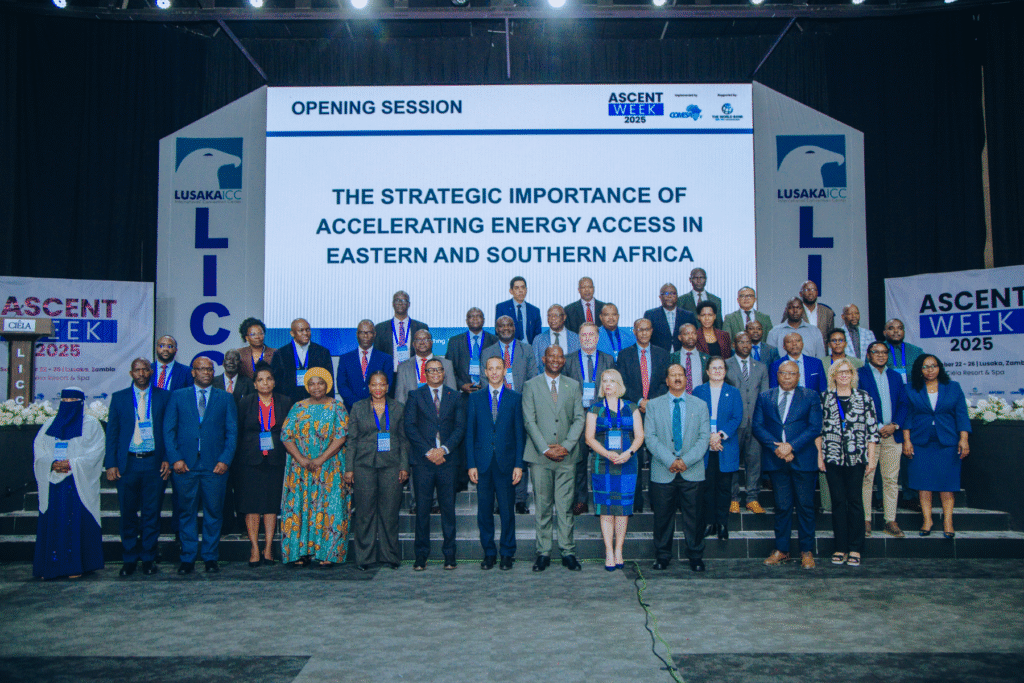
Over 400 high-level stakeholders from the energy sector, including representatives from the public and private sectors, regional organizations, and the international community, gathered in Lusaka for the inaugural Accelerating Sustainable and Clean Energy Access Transformation (ASCENT Week) from 22-26 September 2025. The event aimed to reshape the energy landscape across Eastern and Southern Africa, focusing on expanding sustainable and clean energy access.
Organized by the COMESA Secretariat in partnership with the World Bank, ASCENT Week addressed energy access for over 100 million Africans. The event marked a crucial step in the region’s pursuit of inclusive growth and sustainable development.
The ASCENT Programme is a multi-billion-dollar initiative designed to accelerate energy access through innovative solutions, digital technology and regional cooperation. With an initial investment of $5 billion and plans to mobilize an additional $10 billion from development partners and the private sector, ASCENT aims to electrify homes, power industries and unlock new economic opportunities across more than 20 countries.
Central to the programme is COMESA’s $50 million Regional Acceleration Platform, which provides technical assistance, digital monitoring and knowledge exchange to participating nations. Ambassador Dr. Mohamed Kadah, COMESA’s Assistant Secretary General for Programmes emphasized the significance of ASCENT Week, stating, “It is not just about energy access—it’s about unlocking opportunity, empowering communities and building resilient economies.” He highlighted COMESA’s commitment through the Regional Energy Access Acceleration Platform (REAAP), which supports Member States with expertise and tools to achieve tangible results.
Dr. Dev Haman, Assistant Secretary General for Administration and Finance, called on Member States to prioritize policy harmonization, infrastructure development and private sector engagement. “Aligning energy policies and standards will attract investment and facilitate cross-border trade,” he explained. He also stressed the importance of expanding generation, transmission and distribution networks, especially in underserved regions.
The week featured workshops, policy dialogues and interactive sessions aimed at sharing best practices, accelerating impact, ad planning the next phases of ASCENT’s implementation. Participants included government officials, energy ministries, rural electrification agencies, utilities, regulators and project teams involved in ASCENT.
Zambia’s Minister of Energy, Hon. Makoza Chikote, highlighted the country’s leadership role in regional energy development. Represented by Hon. Mike Mposha, Minister of Green Economy and Environment, he affirmed Zambia’s commitment to scaling up access, modernizing infrastructure and ensuring reliable, affordable energy for all Zambians. “Hosting ASCENT Week showcases our dedication to regional progress,” he said.
The World Bank also underscored the importance of collaboration. Ms. Yadviga Semikolenova, World Bank Energy Practice Manager for Eastern and Southern Africa, noted, “The ASCENT Program signifies a new era of partnership and innovation. Working through regional platforms like COMESA allows us to scale solutions faster and ensure no community is left behind.”
ASCENT Week 2025 is guided by five key objectives: raising awareness of the program’s implementation, exploring ways to accelerate results, sharing successful practices, supporting national efforts, and defining the program’s future steps. The event has set a clear path toward transforming energy access across the region, fostering regional cooperation and achieving sustainable development goals.

